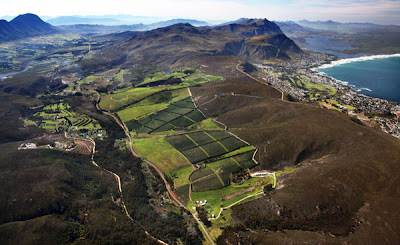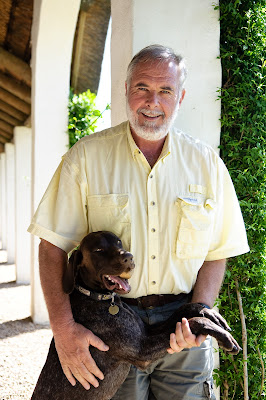Terroir needs to be at the
top of South Africa’s agenda according to one of the country’s leading Pinot
Noir producers, Anthony Hamilton Russell, owner of Hamilton Russell Vineyards
in Walker Bay. “South Africa needs to sort out its terroir message in order for
it to be taken seriously as a fine wine producing country. It will help us
promote our fine wine offering. The importance of terroir very much exists in
South Africa, it just hasn’t been communicated properly yet,” Hamilton Russell
told the drinks business at Cape Wine
last month.
“Terroir is fundamental to the Pinots I produce. The stony, clay-rich soil in Hemel-en-Aarde helps us to get closer in style to Burgundy than any other New World country,” he said, admitting that it has been “tough” being a South African fine wine producer and trying to convince the world of the worth of the country’s top wines: “I’m proud everyone has persevered. If we were American our wines would be on allocation."
 |
| South Africa's premiere Pinot Noir region, Hemel-en-Aarde |
Paul Cluver, managing
director of Elgin-based Paul Cluver Wines, agrees that South Africa’s top end
wines offer “outstanding” value. “You’d never find the same quality/price ratio
in France or the US. We’re just suffering from a bit of an image problem. People
are not willing to pay more than around £20 for South African wine at the
moment. We need to shift our focus to our premium offering and market ourselves
better,” Cluver said.
Hamilton Russell’s Walker
Bay neighbour Peter Finlayson, owner of top Pinot producer Bouchard Finlayson,
agrees that South can get closest to Burgundy in terms of tannin content. “Our best Pinots
are well structured, with good tannins and good extraction. There are no vacumes in the wine business. I’m
seeing a lot of newcomers to Pinot Noir trying to capitalise on the
favourable returns it affords,” he said.
Finlayson believes the challenge for South Africa moving forward is to
look at terroir specification.
“We
need to streamline our efforts and focus on making wines with a sense of place.
I’d like to see the terroir approach really take hold across the Cape. I’m
starting to see it happen,” he said. Thys
Lombard, sales and marketing manager of Tokara meanwhile, believes the key to
success in the fine wine sphere lies in pricing the wines down slightly, so
they remain exceptional value.
“South African fine wines
are starting to enter the market at the price they are supposed to be. We got complacent,
but we’ve lost our arrogance and become critical of ourselves, which is
healthy. We’ve gone back to the drawing board. It’s a good thing that our best
wines are not priced too highly. We’re aiming for the top of course, but I’m
happy for us to be thriving in the middle at the moment.”
Wine writer Michael Fridjhon agrees that rather than
trying to dominate the top tier, South African can carve out a
niche at £10-£20. “I’m not sure the future of South African fine wine lies with
icon wines. The £10-20 bracket is where we should be ploughing our furrows."








No comments:
Post a Comment